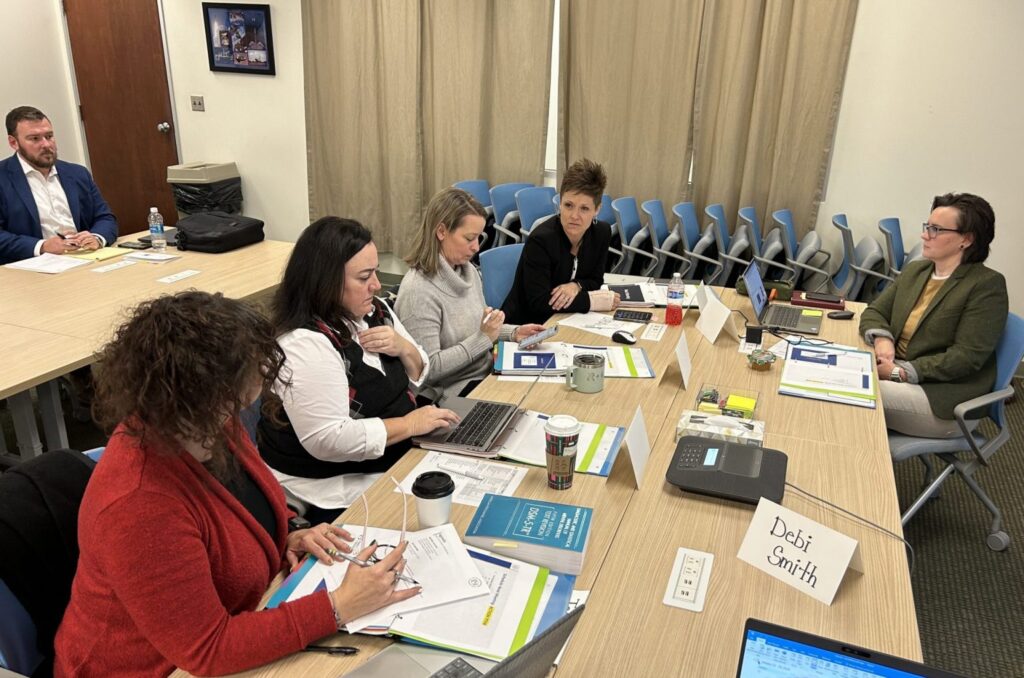
Originally published on Idaho Education News – December 19th, 2023
The Idaho Department of Education workgroup tasked with revising the state’s special education manual will expand from five to 17 members.
The “SLD criteria workgroup” met Tuesday morning for one hour. The meeting focused mainly on planning and logistics. The next two meetings are Jan. 12 and Jan. 25. Both start at 8:30 a.m. at the Idaho Department of Education building in Boise.
The first iteration of the workgroup included the state’s special education director, Chynna Hirasaki, two Special Education Support and Technical Education specialists, and two school psychologists who also serve as special education experts for the state.
State officials announced this month that Idaho’s criteria for special education eligibility does not comply with federal law. The federal government notified Idaho on Oct. 20 that it is not following federal guidelines.
Hirasaki said the Department of Education plans to make an official response to the U.S. Office of Special Education Programs on Jan. 18. That response will detail the work being accomplished by the SLD criteria workgroup.
The Department of Education convened a group of five experts to bring the state’s manual into full compliance with the Individuals with Disabilities Education Act (IDEA), federal law that ensures eligible children with disabilities receive appropriate education services.
The group passed a motion to expand its membership because “a wider range of experts” is needed, Hirasaki said.
They intend to gain perspectives from school districts across the state. “Regional representation is important,” said Emily Boles, director of Special Education Support and Technical Education.
The motion to add 12 additional people passed unanimously. The following individuals will be invited to participate:
- Joy Janssen — SPED director, Lake Pend Oreille, Region 1.
- Lisa McElroy — general education teacher, Region 1.
- Amanda Judd — virtual director, Idaho Virtual Academy, Region 3.
- Ramona Lee — SPED director, West Ada, Region 3.
- Malia Hollowell — SPED teacher, West Ada, Region 3.
- Christy Thompson — charter school representative, Syringa Mountain, Region 4.
- Amber Romriell — speech language pathologist, Pocatello, Region 5.
- Jodie Orme — school psychologist, Fremont, Region 6.
- Molly Fuentealba — higher education, College of Idaho.
- Sally Brown — higher education, College of Idaho.
- Meghan Wonderlich — state director, content and curriculum.
- Melissa Vian — parent education coordinator, Idaho Parents Unlimited.
There was no selection from Region 2 but it appears they are looking for someone. Another 15 names were considered but not selected. But these educators could be considered if nominees decline. Three are from Region 1, four from Region 3, three from Region 4, one from Region 5 and four from Region 6.
They also approved their scope of work, which will be presented to the State Board of Education for consideration when the revision process is done. They approved seven action items :
- Remove or revise the statement limiting special learning disability (SLD) eligibility to school age students.
- Remove and consider revising the response to intervention (RTI) component of Idaho’s criteria, including evidence required to demonstrate correct application of RTI principles and practice.
- Remove the “and” that requires both an RTI-based process and pattern of strengths and weaknesses in psychological processing.
- Consider whether Idaho will adopt additional options for SLD eligibility as allowed by IDEA.
- Provide a recommendation to the State Board to revise the SLD criteria within the manual.
- Create communication, training and professional development for districts and parents to support students under the new SLD criteria.
- Clarify parental notification requirements.
This group should “move right along with this work. We’ve got kids who are depending on us,” Hirasaki said.
Input from stakeholders
The state wants parents, local directors, administrators and advocates to provide input. Submit comments to [email protected].
Idaho Education News requested a copy of those emails. The following comments are a sample of what stakeholders are saying:
- I have been a special education teacher in the state of Idaho for the past nine years. Previously, I was a special education teacher in the states of North Carolina and Maryland. I am interested in providing input for revising our SLD requirements – Karen Toomey
- Please consider the following two important changes: This Hechinger Report piece rightfully details the many reasons why we must end the use of the “discrepancy model” that relies on IQ tests to identify dyslexic students. It is no longer defensible as a method to determine whether a student qualifies for special education services, yet it is likely used widely in Idaho. Please ensure that the revised manual is updated to reflect this much-needed change. Please also make it clear in the revised manual that the provision to offer gifted education services does NOT mandate that those services be provided separately. Enrichment and acceleration can and should be offered to students who want to go beyond grade level expectations, but statute does not require gifted ed services to be exclusive. Research into the harms of academic labels and the lifelong injuries of tracking demonstrate the damage we cause when we segregate our students, something the law does not require when it comes to gifted education. Unfortunately, countless schools and districts are under the mistaken impression that they must separate such students when offering gifted services — the revised manual needs to make plain that this is neither required nor desired — Eric Toshalis
- No one wants to tell the real reason for the discrepancy for fear of getting in trouble, fined, or sued and or it isn’t the politically correct thing to do. But if no one speaks the truth then the real problem won’t get fixed. The real reason there is such a discrepancy has nothing to do with the language “and” or “or”. It has to do with the fact that the SLD Eligibility form is such a horrific nightmare. That may sound overly harsh until you’re the person that has to fill it out for multiple qualifying academic areas. It takes roughly 4 to 5 times longer to fill out than the OHI Eligibility Form. That equates to hours upon hours that no teacher has. The time it takes to fill it out is just one of its problems; the other problem is the poor/confusing way the information is organized in the form. Until that form is fixed so that it is easier to navigate and less time consuming to fill out teachers will continue to opt for OHI when they can. It is the people actually using the form that need to do the reconstructing of the form — Lynda Robbins
- I am interested in participating in this group to review the SPED manual revisions. I would not be able to make the first meeting in person, would it be virtual by any chance? Would any of the meetings be virtual? If not, when are the scheduled meetings so I can give confirmation that I would be able to attend and participate. If I couldn’t, I would have another coworker in mind who would be able to attend in person. Thank you so much for this opportunity — Nancy Grant
- I’d be very interested in being part of the work group to rewrite the state regulations. As a school psychologist working with early childhood (in addition to elementary), I’m particularly interested in helping with the criteria for Developmental Delay — Robin Thurber
- I am interested in assisting in the work group to revise the SLD Eligibility criteria. I was part of the original group that created the current criteria and would be interested in assisting in the revision. I’m currently the National Association of School Psychologists (NASP) Idaho Delegate and on the Idaho School Psychologist Association (ISPA) executive board so would be able to provide input, research, and resources from a school psychologist’s perspective. Also, I just recently retired as a school psychologist from the West Ada School District so would be able to offer my time in the effort — Teresa Fritsch
To learn more about Idaho Virtual Academy, visit https://idva.k12.com/.




